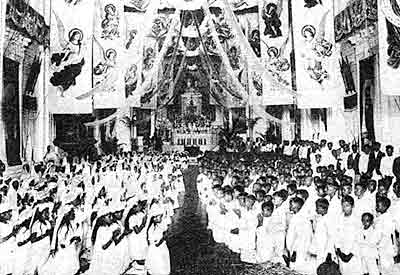|
Newsletter of the District
of Asia
Jul
- Sep 2001
Some Historical
Landmarks
in the History of the Catholic Church
in Sri Lanka
| 1505 |
The
first Portuguese ship arrived in Colombo. On board, there
was a Franciscan priest who celebrated the first Holy Mass
in Sri Lanka. |
| 1534 |
Creation
of Goa Diocese (Portuguese Asia) which included Sri Lanka.
|
| 1543 |
St
Francis Xavier sent a 'clerigo' (most likely a priest) to
the island of Mannar, next to Jaffna, in the North. King
John III of Portugal sent the first permanent priests, Franciscans,
to Sri Lanka. |
| 1544 |
600-700
of the new Christians of Mannar are martyred by the king of
Jaffna. |
| 1545 |
St
Francis Xavier made a quick stop in Colombo, Mannar and Jaffna. |
| 1558 |
Sri
Lanka is detached from Goa and attached to the new diocese
of Cochin, in Kerala (South West India). |
Under
Portuguese Rule
| 1587 |
Portugal
conquered Jaffna. So far, about 2000 faithful and 16 missionaries
have died for the faith. |
| 1602 |
Arrival of the first Jesuits. |
| 1605 |
Arrival
of the first Dominicans. |
| 1606 |
Arrival
of the first Augustinians. |
Within the
first 100 years of the arrival of the faith in Sri Lanka, about
150 churches were built, 68 of which were dedicated to Our Blessed
Lady under 24 titles.
Under
Dutch Rule
| 1637-1658 |
Gradual
fall of all the forts to the Dutch, Jaffia being the last.
Sri Lanka became a Dutch colony. |
| 1687 |
April Blessed
Joseph Vaz arrived in Jaffna as a sick beggar. |
| 1705 |
Arrival
of Fr. Jacome Gonsalves, a great scholar in the Sinhalese
and Tamil languages. |
| 1711,
Jan. 16 |
Death
of Blessed Joseph Vaz. |
| 1742,
July 17 |
Death
of Fr. J. Gonsalves. |
During their
Rule, realizing that the conversions they were obtaining through
violence or by the attraction of worldly rewards would not last,
and that the soul of the Sri Lankans would always be rebellious
to Calvinism, the Dutch Rulers became ardent promoters of paganism.
That way, at least, they would push away the spectre of Catholicism
as far as possible. They managed to save Buddhism which was dying
away, thanks to the work of the Catholic Portuguese missionaries.
In order to reanimate its doctrines, they refilled its empty
temples, and to restore to its ceremonies the Oriental pomp,
the Dutch authorities offered to the King of Kandy their own
ships to go to Siam (Thailand) and fetch 12 young and Zealous Buddhist
monks, able to restore the worship of Buddha.
Nevertheless,
when the persecutors' arms got tired of hitting and of
killing, fifty thousand Catholics appeared in the open. Many
of them came out of the jungle where their hunted ancestors
had hidden themselves. They had regrouped themselves there
in inaccessible villages. The leader, chosen among the best,
baptised the children, presided the Sunday prayers, gave the
talks, assisted at marriages, at the burials. Fidelity to the
Pope of Rome had been jealously preserved. Thus generations
had passed on to one another the Tradition, and, like their
abandoned Christian brothers of Japan, faith had survived amidst
ruins. "
(Fr.
Duchaussois O.M.I.
Sous les feux de Ceylan, Paris,
1929, p.66)
Under
British Rule
| 1796 |
Colombo
capitulated to the British. |
| 1798 |
Sri
Lanka became a British colony. |
"Then,
Albion tried first to destroy by kindness what Holland had
not succeeded to gain by violence. The Anglican, Methodist,
Baptist ministers came with hands full of unction and promises: "Do
you come from Rome?"Asked in their simplicity the Sri Lankans "No,
but now it is the true religion that I bring you!" "Go
away, we only accept here priests from Rome!" (Duchaussois,
op.cit. pp.69-70)
| 1806,
June 4 |
The
British government restored full religious freedom to Catholics.
|
| 1834,
Dec. 3 |
Sri
Lanka became an independent ecclesiastical territory,
the Vicariate Apostolic of Sri Lanka. |
|
At
the same time, the King of Portugal suppressed all religious
orders in his country and colonies. Thus, stopping the Goan
Oratorians from coming to Sri Lanka, which they had done for
150 years (since the arrival of Bl. Vaz). |
| 1847,
Nov. 28 |
Arrival
of the first Oblates of Mary Immaculate (O.M.I.), sent by
St Eugene of Mazenod, founder of the O.M.I. |
| 1886,
Sept.1 |
Canonical
erection of the Catholic Hierarchy of Sri Lanka by
Leo XIII. |
| 1887,
Jan. 6 |
Proclamation,
by the Apostolic Delegate, of the elevation of bishop Christopher
Bonjean, as first Archbishop of Colombo. |
| 1947 |
First
Sri Lankan native Archbishop, Thomas Benjamin Cooray. |

A
first Holy Communion in the good old days!
Sometimes, more than 1000 children would make it together!
Independence
| 1948,
Feb. 4 |
Independence
from England. Most foreign missionaries had to leave in the
following years. |
| 1965 |
Archbishop
Cooray was made Cardinal (he supported the Coetus Internationalis
Patrum during Vatican II). |
| 1976 |
Death
of Cardinal Cooray.
|
|


![]()
![]()
